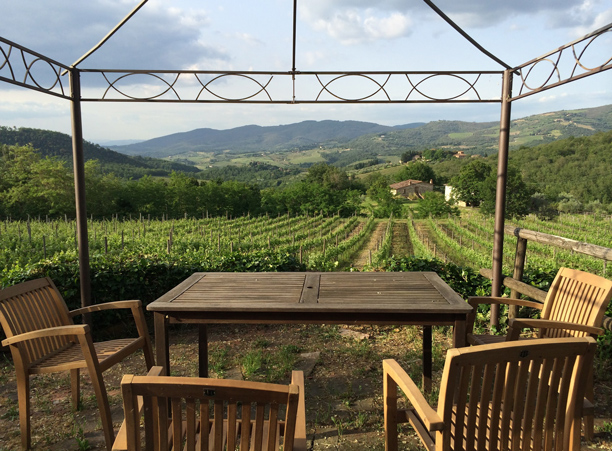Destination Courses in Philosophy
It may make sense to have a summer course that, say, takes students to France to improve their French. Or one that brings them to Japan to study Japanese agricultural methods. Or a marine ecology course that takes place on a boat cruising through the Caribbean. Sometimes “destination” courses, or other courses that involve travel to or study in a specific part of the world, make perfect pedagogical sense—the location or the travel contributes significantly to learning the material and skills the course is aimed to impart.
Which philosophy courses could be like this? Any ideas? Have you taught any destination or travel course in philosophy? What did you do? How did they go? How integral was the location to the learning?
Here’s one example I came across, offered by the College of the Holy Cross:
WHAT: A four-week immersive study program titled “Tuscany and the Philosophy of Food,” part of the College’s summer study abroad program. The highly-interactive course will provide insight into the contemporary food world. Planned activities include following the work at two wine farms, visits to two butchers, bakers, specialty stores, markets, chefs, fishermen, wine-makers, and gastronomes, as well as four home cooked meals prepared by students and faculty under the guidance of expert cooking teachers.
WHY THEY’RE GOING: To put a selection of poignant contemporary and classic readings in dialogue with experiential learning. The course follows food production, consumption, and representation and addresses chief philosophical questions concerning pleasure, ethics, metaphysics, and aesthetics.
WHERE: Panzano, a small historic town in the center of the Chianti region of Tuscany, between Florence and Siena and a short distance from Pisa, Lucca, and San Gimignano. The town is home to the first biological wine district in the world, a world-class butcher shop run by the legendary Dario Cecchini, and an exceptionally rich and varied gastronomic culture, the outcome of millennia of trading and exchanges, which continues to this day.
Sign me up.
Please share your ideas, experiences, and thoughts on this topic, so we can get to planning our courses for next summer.



At what point did ‘poignant’ become an acceptable term to describe philosophy? I’ve been seeing this pop up in student essays as well. Very strange.
Two interesting courses this Summer (aimed at undergrads):
Plato’s Laws on Crete:
Plato’s Laws is set on the island of Crete, where a new city is to be founded. What kind of social and political institutions would make it ideal?
We will explore this question against the background of a modern Cretan city, and visit archaeological sites and museums with some of the finest Minoan art.
Aristotle’s Ethics at Athens:
What is the nature of happiness? How does one become morally excellent? Is being a good citizen the same as being a good person? This seminar offers an introduction to Aristotle’s Nicomachean Ethics and Politics, two works which have been fundamental in the development of Western Civilization.
More info:
http://www.greekstudiesonsite.com/#!summerprogram/ctzx
I’ve offered several of these sort of destination courses and they’re very rewarding, albeit super stressful (lots of planning and recruiting beforehand and lots of fretting over the group while abroad). Instead of full summers, though, I’ve offered them as 2-4 week trips during January, which at my college constitutes its own mini-semester. Travel during January, by the way, offers several advantages compared to the summer: although the weather isn’t as good as it is the summer (at least in the northern hemisphere), prices are much more affordable for students and most destinations aren’t nearly as crowded.
Three location-specific courses:
1. Trip to Greece and Turkey with readings from Aristotle and Herodotus concerning political identity, community, and tourism; we juxtaposed these classic sources with modern discussions about cosmopolitanism, orientalism, and political debates about where/why the boundaries of “Europe” and “the west” are drawn.
2. Trip to Transylvania with readings on the “philosophy of monsters”: we looked at eastern Europe in the gothic imagination and what certain monster types (vampires, werewolves, etc.) presuppose or reveal philosophically.
3. Trip to Holland with readings from the philosophers (Erasmus, Descartes, Spinoza) who lived or took refuge there as a bastion of “free thinking” in the early modern period.
A friend of mine recently told about a friend of his who is an archaeologist, and goes on Mediterranean cruise packages to tell the passengers things of archaeological interest at the various port stops.
Ever since then I’ve thought I need to hire myself out to groups that tour Greece, to give philosophical vignettes.
This article by Jeremy Wisnewski is partly about how to do this ad why it might be a good idea: https://www.academia.edu/24638076/Philosophy_Critical_Pedagogy_and_Experiential_Learning
Duke University has a summer program of cruising around Greece studying ancient philosophy: https://globaled.duke.edu/Programs/Summer/Duke_in_Greece
Thanks for this thread. I have been thinking about this very thing lately, trying to figure out how I can get in on the summer-foreign-travel-teaching action.